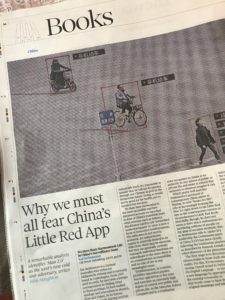The Digital Dictators: How technology strengthens autocracies
Sobering reading for recovering Utopians (like me). From Foreign Affairs:
Led by China, today’s digital autocracies are using technology—the Internet, social media, AI—to supercharge long-standing authoritarian survival tactics. They are harnessing a new arsenal of digital tools to counteract what has become the most significant threat to the typical authoritarian regime today: the physical, human force of mass antigovernment protests. As a result, digital autocracies have grown far more durable than their pre-tech predecessors and their less technologically savvy peers. In contrast to what technology optimists envisioned at the dawn of the millennium, autocracies are benefiting from the Internet and other new technologies, not falling victim to them.
Long essay. Worth reading in full.
Why do people buy SUVs?
I’ve often wondered about this, and concluded that SUV owners are either arrogant or frightened, or both. An interesting piece in Vice suggests that I was on the right track. It draws on Keith Bradsher’s examination of “how the auto industry convinced millions of Americans to buy vehicles that were more dangerous (for themselves and other people on the road), got worse gas mileage, were worse for the environment, and got them to pay a premium for the privilege of doing so.“ It succeeded because the industry mounted “quite possibly the most sophisticated marketing operations on the planet.” The image of prospective SUV purchasers that emerged from the research was deeply unattractive — and, reassuringly, correlated with my own hunches. That portrait is largely the result of one consultant who worked for Chrysler, Ford, and GM during the SUV boom: Clotaire Rapaille.
Rapaille, a French emigree, believed the SUV appealed—at the time to mostly upper-middle class suburbanites—to a fundamental subconscious animalistic state, our “reptilian desire for survival,” as relayed by Bradsher. (“We don’t believe what people say,” the website for Rapaille’s consulting firm declares. Instead, they use “a unique blend of biology, cultural anthropology and psychology to discover the hidden cultural forces that pre-organize the way people behave towards a product, service or concept”). Americans were afraid, Rapaille found through his exhaustive market research, and they were mostly afraid of crime even though crime was actually falling and at near-record lows. As Bradsher wrote, “People buy SUVs, he tells auto executives, because they are trying to look as menacing as possible to allay their fears of crime and other violence.” They, quite literally, bought SUVs to run over “gang members” with, Rapaille found.
And it turned out that the auto industry’s own studies agreed with this general portrait of SUV buyers. Bradsher described that portrait, comprised of marketing reports from the major automakers, as follows:
Who has been buying SUVs since automakers turned them into family vehicles? They tend to be people who are insecure and vain. They are frequently nervous about their marriages and uncomfortable about parenthood. They often lack confidence in their driving skills. Above all, they are apt to be self-centered and self-absorbed, with little interest in their neighbors or communities.
I knew it! It’s always nice to have one’s prejudices confirmed.
Remembering George Steiner
George died last Monday at the ripe old age of 90. I knew and liked him and have written an appreciation which is coming out in next Sunday’s Observer. Adam Gopnik has a nice tribute to him on the New Yorker site:
It was part of the genuine, and not merely patrician, seriousness of his view to see the war years as a fundamental rupture not just in history but in our faith in culture: educated people did those things to other educated people. It was not ignorant armies clashing by night that shivered George Steiner’s soul; it was intelligent Germans who listened to Schubert murdering educated Jews who had trusted in Goethe, and by the train load. This recognition of the limits of culture to change the world was the limiting condition on his love of literature, and it was what gave that love a darker and more tragic cast than any mere proselytizing for “great books” could supply.
May he rest in peace.
How public intellectuals can extend their shelf lives
Useful rules from Tyler Cowen, who knows a thing or two about this.
Why I won’t be upgrading to Catalina any time soon
From Jon Gruber:
Then I think about software. And that means thinking about MacOS 10.15 Catalina. And those thoughts are not good. Off the top of my head I’m hard pressed to think of anything in Catalina that’s an improvement over 10.14 Mojave, and I can think of a lot of things that are worse. I get it that security and convenience are at odds, and it’s a difficult job for Apple to find the balanced sweet spot between the two. But Catalina clearly bends too far in the direction of security. By design, it’s just too inconvenient, with apps generating system-level alerts prompting for permission for things as rudimentary as being able to see the files on my desktop — sometimes when those apps are in the background, and I know that at the moment the alert appears those apps are not trying to read files on my desktop. But why in the world is the desktop treated as some sort of sensitive location?
Back in 2007 Apple ran a “Get a Mac” commercial mocking Windows Vista for this exact same sort of overzealous permission nagging. That’s exactly what Catalina feels like.
I think I’ll sit this upgrade out and wait for the next one.


